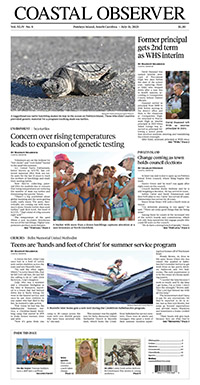Georgetown County
Sales tax proposal has 1 cent to build, another to operate

A vote by Georgetown County Council this week will launch a campaign for another capital projects sales tax, which will require voter approval at the 2024 general election. The penny tax for infrastructure projects is only the first step a two-part plan. The county is considering a second penny tax that will help pay to operate and maintain its facilities.
“There are some pretty creative things you can do,” Administrator Angela Christian told the council at a workshop last week.
But they start with a resolution to put the capital projects sales tax on the ballot, and that needs to happen this week, she said.
Voters approved a penny tax in 2014. It was collected over four years to fund $28.2 million worth of projects, including dredging at Murrells Inlet, road projects and rural fire stations. It ended up raising $69 million, Christian said, although earlier estimates were $41 million.
The surplus was allocated to other capital projects, including the bike path now under construction along Waverly Road and work in the Georgetown harbor.
In early 2020, the county started work on a new capital projects sales tax. It was under way when Christian was hired as administrator and the list of proposed projects reached $459 million before the process was halted. The tax was estimated to raise just over $10 million a year for eight years or $90 million overall.
Christian said the county is still using $10 million as the annual revenue target, but is
proposing a six year tax. Visitors account for an estimated 55 percent of the sales tax collected in the county, she said.
The state law that allows the county to collect the tax requires that a six-member commission be created to come up with a list of projects and draft the referendum questions. Three members would represent the county. The others would represent the three municipalities. Voting would be weighted by population.
The problem with the projects from 2014, Council Member Bob Anderson said, was that “now we can’t afford to operate and maintain them.”
“Be careful about building more stuff,” he said.
After meeting individually with the seven council members, Christian proposed solving that problem with a second penny tax: a local option sales tax.
That also requires voter approval. Under state law, 71 percent of the revenue has to be used to roll back property taxes. The balance would be divided between the county and the municipalities according to population and sale tax collections.
Christian estimates that would generate $2.2 million a year in revenue for the county. Unlike the capital projects tax, the local option tax would only end with another referendum.
The county tried in 1990 and 2004 to implement a local option sales tax with all the revenue earmarked for tax relief. Both referendums failed.
Georgetown is one of three among the state’s 46 counties in the state that has no local sales tax. State law provides nine options.
Horry County has two extra pennies on the 6-cent state sales tax. Myrtle Beach has three cents more. So does Charleston and Charleston County.
Council Member Clint Elliott said the two-pronged approach makes sense.
“I’m just trying to figure out ways to get some O&M money in the budget,” he said.
Council Member Raymond Newton said he hadn’t forgotten how the list grew in the last capital projects effort. “Is there anyway to control the committee?” he asked.
“It would certainly be appropriate,” Christian said.
The council could help set priorities and help the appointees “understand that this is not Christmas.”
Unlike the 2014 projects, the county’s next round of capital projects will be “pay-as-you-go,” she added. The county is issuing bonds to build a $66 million jail, which will limit its borrowing capacity.
That means that the projects funded through the tax should be immediate needs, Christian said.
Anderson pointed out that for the 2014 referendum a public relations firm was hired to poll residents about the projects they would support. The firm was hired in 2020, but no funds were approved for a poll.
The 2014 referendum included projects in each council district. “That was a selling tool,” Council Member Lillie Jean Johnson said.
The council is also due to adopt a new schedule of impact fees to replace the current fees that were adopted in 2009. Those are tied to capital improvements that have now been completed.
The fees will pay for the portion of roads, law enforcement and parks facilities needed to accommodate growth. The fees are estimated to raise $18.5 million over the next 10 years, more if the three municipalities participate, which they aren’t doing now.
Fees will decline for most single-family homes because they will be based on the square footage. The current fee is fixed.
Non-residential construction will see fees increase, although they won’t pay a parks fee. That’s because they generate more traffic and demand for law enforcement, said Colin McAweeney, an analyst for the consulting firm TischlerBise, which prepared the fee study.
Council Chairman Louis Morant noted the fee for schools would rise fivefold and wondered if the increases for commercial buildings would discourage construction in rural areas where the county wants to encourage growth.
Council Member Everett Carolina said he was also concerned the county could lose business.
Anderson pointed out the purpose is to make sure new development pays its share of infrastructure.
Another source of revenue under consideration is a business license. Georgetown is the only coastal county without one.
Christian proposed a flat registration fee earlier this year. Council members told her they wanted to look at a license based on revenue. While that would raise more money, it would cost more to initiate and maintain, she said.




